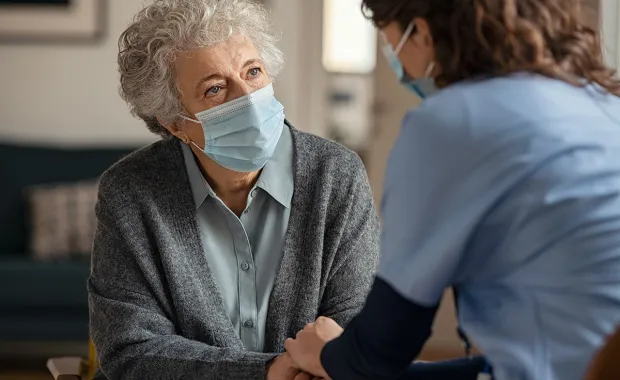Dr. Peake was among CGI’s experts attending HIMSS22. In part one of this two-part blog series, he shares his observations. Read part two.
Prior to the pandemic, tens of thousands of health professionals gathered at the HIMSS Global Health Conference to network and share best practices. Last month, in a robust conference return, it was a pleasure to be among the 28,000 attendees, reconnecting with one another after unprecedented challenges in this industry. There was a feeling of being on the road to recovery and getting back to business. Given the tremendous sacrifices of health professionals during this pandemic, it was also a time to recognize those on the frontlines for their extraordinary service.
For those of us focused on supporting health sector clients at CGI, HIMSS is a place where we strengthen relationships with clients and partners in the broader healthcare ecosystem, as well as learn from innovative leaders across the industry. I was glad to be back in the company of so many dedicated practitioners and industry innovators.
Sense of global community
I felt a strong sense that this conference truly has become a global event. Having served on the HIMSS board seven years (until 2018), the transition to this global focus is something the organization has worked to achieve for several years now. I congratulate everyone involved in this quest over the years. Throughout the conference, the theme of globalism—the need to reimagine health and well-being for everyone, everywhere—was prevalent. HIMSS President and CEO Hal Wolf put it well: “We must think globally to truly change healthcare.”
The next global HIMSS event is the European Health Conference this summer in Helsinki. We look forward to continuing these conversations and deepening our relationships there.
Social determinants of health get special focus
Social determinants of health (SDoH) had a special focus at HIMSS22. Numerous sessions tackled the challenge of how to ensure equity in access and quality of care, and how social determinant data can link to innovative care delivery.
Researchers believe SDoH drive more than 80% of health outcomes. Medical care alone is insufficient to improve health as it is estimated to account for only 10-20% of the modifiable contributors to improved health outcomes. Individuals spend less than 1/10th of 1% of their time in the doctor’s office, and what happens there only impacts 20% of their health outcome.
Far more important are the impacts of personal determinants of health (PDoH) behaviors and SDoH, the conditions in which people are born, grow, work, live and age, and the wider set of forces and systems shaping the conditions of daily life. CGI’s Lightning Session on Refining the Customer/Patient Experience touched on several of these topics.
It’s vital to stay focused on using technology to close gaps and disparities for underserved populations exposed by the pandemic. As shared by Chiquita Brooks-Lasure, the Administrator of the U.S. Centers for Medicare and Medicaid Services, we need to build a data-connected healthcare system to address the inequities.
Modernizing health for the U.S. military and veterans
Interoperability is a perennial topic, and there was a continued emphasis on its importance. I spent time at discussions around efforts by the U.S. Department of Defense (DoD), Department of Veterans Affairs (VA) and U.S. Coast Guard (USCG) to create a common federal electronic health record (FEHR) across the continuum of care for service members, veterans and their families. The DoD is about half-way there with rolling out their modernized electronic health record (MHS GENESIS). The system will support 475 military treatment facilities and 9.5 million DoD beneficiaries around the world by the end of 2023.
What lessons can be learned from this massive undertaking by these agencies and their commercial partners using interoperability to create new possibilities for transformation? One lesson is that such transformations must be evolutionary in nature and require continuous-learning organizations. Keys to achieving adoption at the grassroots level are strong human-centered design and change management principles. Additionally, with 70% of military care estimated to be purchased outside the DoD, and with the Mission Act increasing access for veterans to the civilian care community, interoperability needs to be universal to encompass all aspects of the patient journey.
Also on the interoperability topic, CGI experts presented a Lightning Session on a new approach to interoperability that enables data sharing via a blockchain ledger-based cloud solution.
A zero-trust model for cybersecurity
Cybersecurity was another ongoing challenge covered in many sessions. In 2021, 40+ million health records were compromised in the U.S. alone. Appointments and surgeries had to be canceled because records could not be accessed. CGI’s Paresh Patel said in his session that, at the core of several executive orders issued by President Biden is zero trust, a model that starts with a change in mindset. Its principle is, never trust, always verify.
For more observations on HIMSS22, I invite you to read a blog by my colleague Sime Pavlovic, on the themes of integrated care, virtual care and greater use of technology to improve the patient experience and support health professionals.
Despite the many positive experiences at HIMSS22, we also experienced the tragic passing of Dr. SaraBeth Hartlage, the assistant medical director for Louisville Metro Public Health and Wellness in Kentucky. In addition to her tireless contributions to the health and wellbeing of greater-Louisville citizens and their diverse communities, especially during the COVID-19 pandemic, Dr. Hartlage was an inspiration to everyone around her, including those of us at CGI who were fortunate enough to work with her over the past several years. We offer our condolences to all family, friends and those touched by the noble efforts of Dr. Hartlage.






